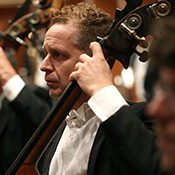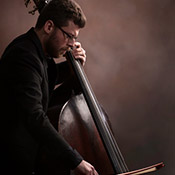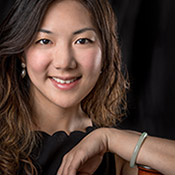
Lunch With Laura
DAVID LEWELLEN
PUBLISHED
Tagged Under: Bass, MSO Musicians
Standing in line at Panera in Brookfield, I hear Laura Snyder’s booming voice. “You got here before me!” I turn and greet her, the Milwaukee Symphony’s senior member, a talented singer as well as bassist, and an all-around force of nature.
She orders coffee and a fruit salad, and as we settle into our booth, she asks, “Now how are those adorable kids of yours?” I fill her in, and she tells me about her 8-year-old granddaughter and sighs at how time is passing.
It has been nearly 47 years since she joined the MSO’s bass section. “I didn’t think I was that old,” she says, shaking her head. “I started when I was 4. Put that in!” Her laugh almost splits her face.
And for nearly two hours, Laura Snyder tells stories — about coming to Milwaukee in 1970 (“I got a little apartment on the East Side and paid $5 a month extra for the lake view, except it was usually clouded over”), about riding the subway from Queens to Manhattan for bass lessons as a teenager (“No one bothered me. I’d whack them with my bow. You act like you’re a tough kid”), and about the summer concert in the park when a speaker fell on the guest conductor’s wife (deadpan, “She wasn’t badly hurt”).
How did she come to play bass in the first place? “I was in seventh grade, in intro to strings class. The director said, ‘Who wants to play violin?’ and I put my hand up, and he chose a bunch of kids. Then he said, ‘Who wants to play viola?’ and I put my other hand up, and he chose some other kids, but not as many. Then he said, ‘Who wants to play cello?’ and this time I put both hands up, but he still didn’t choose me. There were five kids left, and five basses, so that’s what I got. Later that year, I asked him why he didn’t pick me for one of the other instruments. He said, ‘I saw your hands, and I knew they were big enough to play the bass.’”
Playing the bass is generally not a glamorous job. “But we are the foundation,” Snyder says. “If that foundation doesn’t work well, it can destroy everything around it. Everyone listens to the melody, but if that bottom’s not there, there’s a lot missing.”
The bass she plays now, an Italian instrument from the 18th century, is a legacy from David Phillips, a former MSO colleague who died of cancer. “He had a statue of Buddha in his room, and I’m a Christian, and he asked me to pray for him. He wanted to make sure he was covered,” she says with a laugh. “Every time I pick up that instrument, I think of David.” But thinking back 300 years, “I wish I had the gift of putting my hand on this instrument and seeing all the people who have had it.” Eventually it will pass to a new owner, but she sees herself only as its custodian.
At Indiana University, she also studied voice (which is another story: a professor heard her calling out to a friend in the hallway and told her she had a gift). She has sung semi-regularly with the MSO over the years, including a few days after the terrorist attacks of Sept. 11, 2001. Doc Severinsen was conducting a pops concert that week, and after the decision was made not to cancel, he made a request to Snyder: Close the concert by singing “Amazing Grace,” on a darkened stage with spotlights on her, a lighted candle, and the flag. “It was very difficult to keep my composure,” she remembers. “You can’t sing and cry.”
As we talk, a young woman approaches. “Mrs. Snyder!”
Snyder’s eyes widen in delight as she exclaims, “Jessie!” It’s a friend from the church she used to attend. She leans in for a hug and they catch up. “Say hello to everyone who remembers me!” she calls as Jessie leaves.
“I will. I love you.”
“I love you. … Lots of people know me,” she says with a smile. “From the symphony, from church, generations of students. And there aren’t too many African-Americans in Brookfield.”
There are also very few African-Americans playing in full-time professional orchestras. Snyder remembers a long-ago meeting with a Milwaukee alderman who wanted to know why she was (then) the only African-American in the MSO, and she explained it was because they lacked qualified applicants. However, she participates in Sphinx, an all-black and Latino orchestra based in Detroit that offers mentoring and scholarships to young musicians. But a broader problem, she says, is that children of all races aren’t getting the exposure to classical music that they might have a few generations ago.
Snyder’s two sons, Jared and Jon, have non-musical careers. Her daughter, Jennifer, is a professional violist who lives in the townhouse next door to her and often substitutes with the MSO.
Despite a 47-year career so far, she has no plans to quit. “When it’s no longer fun, or when I can’t pick up my bass, I’ll retire,” she says. “There’s joy in my life. Sometimes people tell me they watch me onstage, and how I respond to the music. That’s part of what we should be doing. Maybe it’s easier for me — you can’t smile while you’re playing the oboe — but if you see yourself as an entertainer, people will see that and they’ll want to come back.”
Her fruit salad is gone, my notebook is full, and outside Panera we say goodbye. I want to come back.



